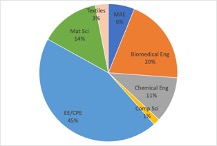ERC Minor in Nanoscience and Technology at North Carolina State University Celebrates 10 Years
Outcome/Accomplishment
The NSF-funded Engineering Research Center (ERC) for Advanced Self-Powered Systems of Integrated Sensors and Technologies (ASSIST) is marking its tenth year of offering a multidisciplinary minor in nanoscience and technology for undergraduates at its headquarters at North Carolina State University, preparing students to join the workforce as scientists and engineers.
Impact/Benefits
Nanotechnology is one of the fastest growing markets globally with a corresponding need for trained nanoscience researchers and scientists. The minor degree program prepares undergraduates for the global workforce by combining technical training in nanoscience and technology with diversity awareness, engineering ethics, and global issues in science and technology.
Explanation/Background
The NSF-funded Center's multidisciplinary minor program in nanoscience and technology at North Carolina State University was launched during the fall 2013 semester and has remained active since. The program has been very successful in recruiting students from a variety of engineering majors and has enrolled 65 students and graduated 42 students to date.
The 18-credit-hour program admits students from all engineering disciplines and includes an introductory course on nanoscience and technology and three technical electives. To underscore the multidisciplinary nature of the program, students are required to take at least one elective from outside their home department. The minor also requires two non-technical courses on diversity and global issues and engineering ethics.
Location
Raleigh, North Carolinawebsite
Start Year
Biotechnology and Healthcare
Biotechnology and Healthcare
Lead Institution
Core Partners
Fact Sheet
Outcome/Accomplishment
The NSF-funded Engineering Research Center (ERC) for Advanced Self-Powered Systems of Integrated Sensors and Technologies (ASSIST) is marking its tenth year of offering a multidisciplinary minor in nanoscience and technology for undergraduates at its headquarters at North Carolina State University, preparing students to join the workforce as scientists and engineers.
Location
Raleigh, North Carolinawebsite
Start Year
Biotechnology and Healthcare
Biotechnology and Healthcare
Lead Institution
Core Partners
Fact Sheet
Impact/benefits
Nanotechnology is one of the fastest growing markets globally with a corresponding need for trained nanoscience researchers and scientists. The minor degree program prepares undergraduates for the global workforce by combining technical training in nanoscience and technology with diversity awareness, engineering ethics, and global issues in science and technology.
Explanation/Background
The NSF-funded Center's multidisciplinary minor program in nanoscience and technology at North Carolina State University was launched during the fall 2013 semester and has remained active since. The program has been very successful in recruiting students from a variety of engineering majors and has enrolled 65 students and graduated 42 students to date.
The 18-credit-hour program admits students from all engineering disciplines and includes an introductory course on nanoscience and technology and three technical electives. To underscore the multidisciplinary nature of the program, students are required to take at least one elective from outside their home department. The minor also requires two non-technical courses on diversity and global issues and engineering ethics.

